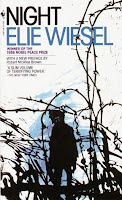Night by Elie Wiesel
 Title/Author: Night/Elie Wiesel
Title/Author: Night/Elie Wiesel
Publisher: Bantam Books
Pages: 109
ISBN 13: 978-055-327-253-6
In a nutshell
Night is narrated by Eliezer (Elie Wiesel) a survivor of the Holocaust during WWII. Wiesel recounts his experiences as a Jewish boy of about 13 as his family is first restricted to a ghetto in his hometown, Sighet, in Hungarian Transylvania. They were then transported by train to Auschwitz where he is separated from all of his family except for his father, who becomes his only reason for life over the next couple of years. In this short book Wiesel tells us his deportation to the concentration camps at the age of 15 and his struggle to survive.
My thoughts
Unlike others, I couldn't finish this book in one sitting. It took me one week. Each time I read about the helpless Jews struggling to survive the brutality of the Nazis, I felt sick in the stomach. I just couldn't comprehend how could one be so inhumane? How can one find pleasure in torture and in burning and burying people alive? I found myself also asking, where's God in all this? Why did He let them suffer? How could He? Such events shook the faith of even the most faithful. Elie Wiesel noted, "For the first time I felt revolt rise up in me. Why should I bless His name? The Eternal, Lord of the Universe, the All-Powerful and Terrible, was silent. What had I to thank Him for?"
Some of the Jews believed that God was testing them. "God is testing us. He wants to find out whether we can dominate our base instincts and kill the Satan within us. We have no right to despair. And if he punishes us relentlessly, it's a sign that he loves us all the more."
At the beginning, the Jews looked out for each other, but after enduring the endless beatings and witnessing those brutal mass murders, they lost faith and only looked out for themselves. In one incident, a son left his father to survive on his own. "[Rabbi Eliahou’s son] had felt that his father was growing weak, he had believed that the end was near and had sought this separation in order to get rid of the burden, to free himself from an encumbrance which could lessen his own chances of survival." "Here there are no fathers, no brothers, no friends," a Kapo tells him. "Everyone lives and dies for himself alone."
War does that to people I guess. It divides as much as it unites. It breaks as much as it builds. Just by visualising their lifeless bodies spread across those pages, reading about their hunger, pain and torment in every chapter, I could almost hear their muted cries of desperation and rage, smell the stench of burnt bodies, see dreams turned to dust. Their souls and minds tortured, broken, strengthened.
The only person that gave Wiesel the will and reason to survive was his father, Schlomo, who depended on him. In the memoir, it showed that Wiesel was constantly thinking of his father and that he loved his father dearly. This kept his sanity. I guess because his father reminded him of love, family and commitment. His father's presence reminded him that there's still goodness in his heart and he cannot allow himself to be part of the cruelty and selfishness. In Buchenwald, however, Schlomo dies of dysentery and physical abuse.
I can't say that I enjoyed this book, as it'd sound as though I like reading about pain and sufferings. But it has made me realise that historical events such as this could shake even the most faithful servant of God, and that we can show no compassion, not even an ounce of humanity, worse than animals in fact, when pushed to the extremes. This is a terrifying truth.
From Wikipedia: Night is the first book in a trilogy—Night, Dawn, and Day—reflecting Wiesel's state of mind during and after the Holocaust. The titles mark his transition from darkness to light, according to the Jewish tradition of beginning a new day at nightfall.
Book Bite
After being rescued by the allied armies, Wiesel took a vow of silence on the subject of his experiences for 10 years.
Like many survivors, Wiesel could not find the words to describe his experiences. However, a meeting with François Mauriac, the 1952 Nobel Laureate in Literature, who eventually became Wiesel's close friend, persuaded him to write about his experiences. [Source: Wikipedia]



Comments